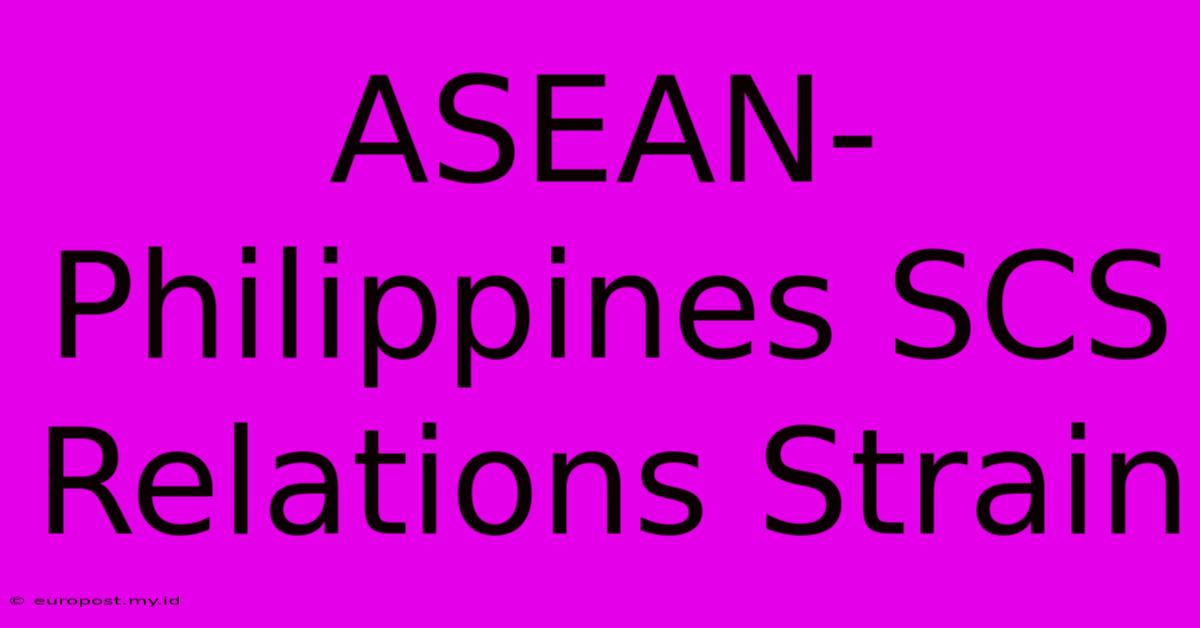ASEAN-Philippines SCS Relations Strain

Discover more in-depth information on our site. Click the link below to dive deeper: Visit the Best Website meltwatermedia.ca. Make sure you don’t miss it!
Table of Contents
ASEAN-Philippines SCS Relations: Navigating Strained Waters
The South China Sea (SCS) has long been a focal point of geopolitical tension, and the relationship between the Association of Southeast Asian Nations (ASEAN) and the Philippines plays a crucial role in shaping the region's stability. Recent events have strained this relationship, highlighting the complexities of balancing national interests with regional cooperation. This article delves into the key factors contributing to these strains and explores potential pathways towards a more constructive future.
The Source of the Strain: Competing Claims and Inaction
The core issue remains the competing claims over the SCS's resources and territories. China's assertive stance, including its construction of artificial islands and disregard for international law as enshrined in the United Nations Convention on the Law of the Sea (UNCLOS), is a major source of friction. The Philippines, with its legitimate claims based on UNCLOS, finds itself caught between its desire for regional peace and the need to protect its sovereign rights.
Philippines' Frustration with ASEAN's Response
The Philippines' frustration stems largely from what it perceives as ASEAN's slow and inadequate response to China's actions. While ASEAN has adopted the Declaration on the Conduct of Parties in the South China Sea (DOC), its implementation has been hampered by a lack of concrete mechanisms for enforcement and China's reluctance to fully comply. The perceived reluctance of some ASEAN member states to directly confront China, due to economic or political considerations, further exacerbates the Philippines' concerns. This inaction leaves the Philippines feeling vulnerable and isolated in its pursuit of justice and the protection of its maritime interests.
Beyond the Territorial Disputes: Economic and Security Implications
The SCS dispute transcends mere territorial claims. The area boasts rich fishing grounds, significant hydrocarbon reserves, and crucial shipping lanes. China's actions directly impact the Philippines' access to these resources, affecting its fishing industry and potentially hindering its economic development. Furthermore, the militarization of the SCS poses significant security challenges, raising concerns about regional stability and the potential for escalation.
The Impact on Regional Stability
The ongoing tension undermines regional stability and trust. It diverts resources from cooperative endeavors and creates an environment conducive to miscalculation and conflict. This instability has broader economic consequences, affecting trade, investment, and tourism throughout the region. The Philippines, given its strategic location, is particularly vulnerable to these destabilizing effects.
Finding a Path Forward: Strengthening ASEAN and International Cooperation
Addressing the strained relationship requires a multi-faceted approach. Strengthening ASEAN's unity and effectiveness in dealing with China's actions is paramount. This includes developing more robust mechanisms for implementing the DOC and potentially negotiating a more legally binding Code of Conduct (COC).
The Role of International Law and External Partners
The Philippines' pursuit of justice through international legal avenues, leveraging the UNCLOS ruling in its favor, remains crucial. Continued engagement with key international partners, such as the United States, Australia, Japan, and the European Union, can provide diplomatic support and strengthen the Philippines' position. These partnerships can offer crucial balance to China's influence and bolster the collective efforts towards maintaining regional peace and security.
Conclusion: A Balancing Act for the Future
The strained ASEAN-Philippines relationship in the context of the SCS highlights the challenges of balancing national interests with regional cooperation. While the path towards a peaceful resolution remains arduous, a combination of stronger ASEAN unity, adherence to international law, and robust international partnerships offers the best hope for navigating these complex waters and ensuring a stable and prosperous future for the region. The Philippines' continued commitment to diplomacy, alongside a strong defense posture, will be critical in safeguarding its sovereign rights and contributing to regional stability. The future of the SCS and the ASEAN-Philippines relationship hinges on collaborative efforts to find a balance between competing claims and the collective pursuit of peace.

Thank you for taking the time to explore our website ASEAN-Philippines SCS Relations Strain. We hope you find the information useful. Feel free to contact us for any questions, and don’t forget to bookmark us for future visits!
We truly appreciate your visit to explore more about ASEAN-Philippines SCS Relations Strain. Let us know if you need further assistance. Be sure to bookmark this site and visit us again soon!
Featured Posts
-
Sg Jahang Tragedy Kampar Recreation Update
Nov 16, 2024
-
Taylor Retains Titles Despite Controversy
Nov 16, 2024
-
S Atan Malaysian Music Composer Passes
Nov 16, 2024
-
Taylor Serrano 2 Decision Sparks Debate
Nov 16, 2024
-
Fast Telescope Soft Power Influence
Nov 16, 2024
